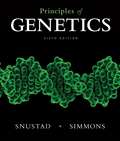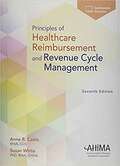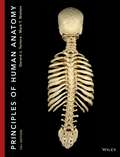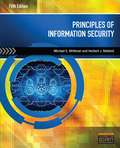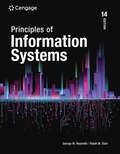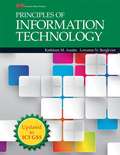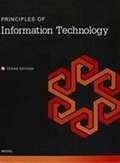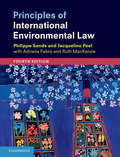- Table View
- List View
Principles of Economics, Sixth Edition
by N. Gregory MankiwWith its clear and engaging writing style, Principles of Economics (Sixth Edition) continues to be one of the most popular books on economics available today. Mankiw emphasizes material that you are likely to find interesting about the economy (particularly if you are studying economics for the first time), including real-life scenarios, useful facts, and the many ways economic concepts play a role in the decisions you make every day.
Principles of Environmental Science: Inquiry and Application
by William P. Cunningham Mary Ann CunninghamNIMAC-sourced textbook
Principles of Environmental Science: Inquiry and Applications (6th Edition)
by William P. Cunningham Mary Ann CunninghamThis concise text provides an up-to-date, introductory view of essential themes in environmental science along with offering students numerous opportunities to practice scientific thinking and active learning.
Principles of Financial Accounting
by John Wild Ken ShawPrinciples of Financial Accounting responds to the market’s request for a financial accounting text with a sole-proprietorship approach. Chapter opening vignettes using dynamic entrepreneurs appeal to all students and show the relevance of accounting. Students are encouraged to think like a businessperson and apply what they learn. A wide variety of assignments provide instructors with materials to teach, assess, and challenge students on several levels.
Principles of Fire Prevention, Third Edition
by David DiamantesThe Third edition of Principles of Fire Prevention covers the National Fire Academy's Fire and Emergency Services Higher Education (FESHE) associate level Fire Prevention Course. The Third Edition provides a comprehensive and concise overview of the history and philosophy of fire prevention, the agencies and organizations involved in the field today, and the regulatory aspects and functions associated with plan review inspection, fire protection systems testing, and fire investigation. It also covers the elements of public education and community risk reduction as well as the logistics or record keeping, staffing and financial management, so that readers are fully prepared to plan implement, and lead successful fire prevention program.
Principles of Food Science
by Janet D. Ward Larry T. Ward Jodi Songer RiedelThis book demonstrates how the laws of science are at work in producing, processing, preparing, preserving, and metabolizing food. Students learn how cooking, health, and storage tips connect science basics to daily food encounters. The text covers the basic laws of chemistry, microbiology, and physics as they relate to food components and complex food systems. Students learn scientific facts and principles that they can apply to a future food science career and to more-creative, nutritious home cooking. The requirements and opportunities for obtaining a food science career are explored as well as the impact of this career path on local, national, and global economies. You also learn how cooking, health, and storage tips connect science basics to daily food encounters.
Principles of General Chemistry (Second Edition)
by Martin S. SilberbergSilberberg’s Principles of General Chemistry offers students the same authoritative topic coverage as its parent text, Chemistry: The Molecular Nature of Matter and Change. The Principles text allows for succinct coverage of content with minimal emphasis on pedagogic learning aids. This more straightforward approach to learning appeals to today’s efficiency-minded, value-conscious instructors and students without sacrificing depth, clarity, or rigor.
Principles of Genetics (Sixth Edition)
by D. Peter Snustad Michael J. SimmonsSnustad's 6th edition of Principles of Genetics offers many new and advanced features including boxed sections with the latest advances in Genetics, a streamlined roster of topics, a more reader-friendly layout, and new problem-solving supplements. Furthermore, this new edition includes more problem solving within each chapter through the Test Your Problem Solving Skills feature and a Solve It icon to prompt readers to go online to WileyPlus for animated tutorials. A new one-column design better showcases important pieces of art and avoids the "overwhelmed" reaction readers have to the crowded layouts found in many other texts. Boxed sections reduce in size to help maintain the flow of the text and the Focus On boxes are revised to include the most current developments in genetics as well as most relevant topics.
Principles of Geoarchaeology: A North American Perspective
by Michael R. WatersPresents the basics of geoarchaeology, through application of field techniques to a study of the late Quaternary of America. Alluvial, terrestrial and coastal environments are considered, as well as post burial physical disturbances of archaeological sites.
Principles of Group Solidarity
by Michael HechterSocial scientists have long recognized that solidarity is essential for such phenomena as social order, class, and ethnic consciousness, and the provision of collective goods. In presenting a new general theory of group solidarity, Michael Hechter here contends that it is indeed possible to build a theory of solidarity based on the action of rational individuals and in doing so he goes beyond the timeworn disciplinary boundaries separating the various social sciences.
Principles of Healthcare Reimbursement
by Anne CastoPrinciples of Healthcare Reimbursement integrates information about all US healthcare payment systems into one authoritative resource. Boost your understanding of the complex financial systems in today's healthcare environment, including the basics of health insurance, public funding programs, managed care contracting, and how services are paid. Gain clear insight into how reimbursement systems have made an impace on providers and payers, consumers, public policy makers, and the development of classification and information technology systems over the years.
Principles of Healthcare Reimbursement
by Anne CastoPrinciples of Healthcare Reimbursement 7th Edition
Principles of Human Anatomy
by Gerard J. Tortora Mark T. NielsenA market-leading text through its many editions, the 13th edition of Principles of Human Anatomy continues to successfully blend visual and textual elements to illuminate the complexities of human anatomy. Written for the 1-term human anatomy course, the 13th edition raises the standard for excellence in this discipline with its enhanced illustration program, refined narrative, and the integrated design of dynamic resources like Real Anatomy 2. 0 into the curriculum.
Principles of Human Anatomy
by Gerard J. Tortora; Mark T. NielsenImmerse yourself in the spectacular visuals and dynamic content of Principles of Human Anatomy, 14th Edition. Designed for the 1-term Human Anatomy course, this 14th edition raises the standard for excellence in this discipline with its enhanced illustration program, refined narrative, and dynamic resources. Principles of Human Anatomy is a rich digital experience, giving students the ability to learn and explore human anatomy both inside and outside of the classroom.
Principles of Igneous and Metamorphic Petrology (Second Edition)
by John D. WinterThis text is designed for use in advanced undergraduate or early graduate courses in igneous and metamorphic petrology. The book is extensive enough to be used in separate igneous and metamorphic courses, but I use it for a one-semester combined course by selecting from the available chapters. The nature of geological investigations has largely shaped the approach that I follow.
Principles of Information Security
by Michael E. Whitman Herbert J. MattordSpecifically oriented to the needs of information systems students, PRINCIPLES OF INFORMATION SECURITY, 5e delivers the latest technology and developments from the field. Taking a managerial approach, this bestseller teaches all the aspects of information security-not just the technical control perspective. It provides a broad review of the entire field of information security, background on many related elements, and enough detail to facilitate understanding of the topic. It covers the terminology of the field, the history of the discipline, and an overview of how to manage an information security program. Current and relevant, the fifth edition includes the latest practices, fresh examples, updated material on technical security controls, emerging legislative issues, new coverage of digital forensics, and hands-on application of ethical issues in IS security. It is the ultimate resource for future business decision-makers.
Principles of Information Systems
by Ralph M. Stair Mark Frydenberg George W. Reynolds Joey Bryant Hollis Greenberg George SchellDevelop an understanding of the core principles of information systems (IS) and how these principles make a difference in today's business environment with Stair/Reynolds' PRINCIPLES OF INFORMATION SYSTEMS, 14E. Completely reorganized for clarity and focus, this fresh new edition provides engaging new chapter opening cases and a new chapter on AI and automation. You explore the challenges and risks of cybercrime, hacking, internet of things, and artificial intelligence as you examine the latest IS research and learn from memorable examples. You can even maximize your employability as you learn how to use IS to increase profits and reduce costs in organizations. You study the latest in big data, business intelligence, cloud computing, e-commerce, enterprise systems, mobile computing, strategic planning, and systems development.
Principles of Information Technology
by Kathleen M. Austin Lorraine N. BergkvistPrinciples of Information Technology presents basic principles and concepts about information technology to help students become more valuable employees, better citizens, and knowledgeable consumers. Written specifically for high school students, this text maps to the IC3 Digital Literacy Certification standards. By studying this text, students can prepare for taking the Certiport IC3 Digital Literacy Certification exams. IC3 Digital Literacy Certification is a well-respected and internationally recognized credential.
Principles of Information Technology: Preparing for IC3 Certification
by Suzanne WeixelNIMAC-sourced textbook
Principles of Instrumental Analysis
by Douglas A. Skoog F. James Holler Stanley R. CrouchPRINCIPLES OF INSTRUMENTAL ANALYSIS, 7th Edition, places an emphasis on operating principles of each type of instrument, its optimal area of application, its sensitivity, its precision, and its limitations. You'll also learn about elementary analog and digital electronics, computers, and the treatment of analytical data.
Principles of International Environmental Law: Frameworks, Standards, And Implementation (Studies In International Law)
by Philippe Sands Jacqueline Peel Adriana Fabra Ruth MacKenzieThis new and fully updated edition of Principles of International Environmental Law offers a comprehensive and critical account of one of the fastest growing areas of international law: the principles and rules relating to environmental protection. Introducing the reader to the key foundational principles, governance structures and regulatory techniques, Principles of International Environmental Law explores each of the major areas of international environmental regulation through substantive chapters, including climate change, atmospheric protection, oceans and freshwater, biodiversity, chemicals and waste regulation. The ever-increasing overlap with other areas of international law is also explored through examination of the inter-linkages between international environmental law and other areas of international regulation, such as trade, human rights, humanitarian law and investment law. Incorporating the latest developments in treaty and case law for key areas of environmental regulation, this text is an essential reference and textbook for advanced undergraduate and postgraduate students, academics and practitioners of international environmental law.







